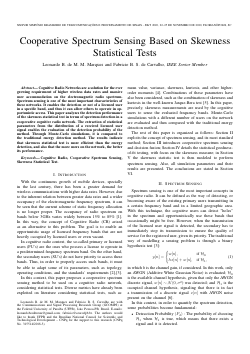
Cooperative Spectrum Sensing Based on Skewness Statistical Tests
Leonardo B. de M. M. Marques, Fabricio Braga Soares de Carvalho
DOI: 10.14209/SBRT.2020.1570660124
Evento: XXXVIII Simpósio Brasileiro de Telecomunicações e Processamento de Sinais (SBrT2020)
Keywords: Cognitive Radio Cooperative Spectrum Sensing Skewness Statistical Test
Abstract
Cognitive Radio Networks are a solution for the ever growing requirement of higher wireless data rates and massive user accommodation on the electromagnetic radio spectrum. Spectrum sensing is one of the most important characteristics of these networks. It enables the detection or not of a licensed user in a specific band, and thus it can allow others to operate in opportunistic access. This paper analyzes the detection performance of the skewness statistical test in terms of spectral detection in a cooperative cognitive radio network. The extraction of statistical parameters from the distribution of a received licensed user signal enables the evaluation of the detection probability of the method. Through Monte-Carlo simulations, it is compared to the traditional energy detection method. The results indicate that skewness statistical test is more efficient than the energy detection, and also that the more users on the network, the better its performance.Download